The connector form factor has, until recently, divided users into Tesla and non-Tesla car owners. However, today we already have on pre-sale the Tesla adapter and the Magic Dock, which allow charging a Tesla car from speed chargers with CCS connectors, known to be available only to owners of Chevy, Porsche, BMW, and other non-Tesla cars.
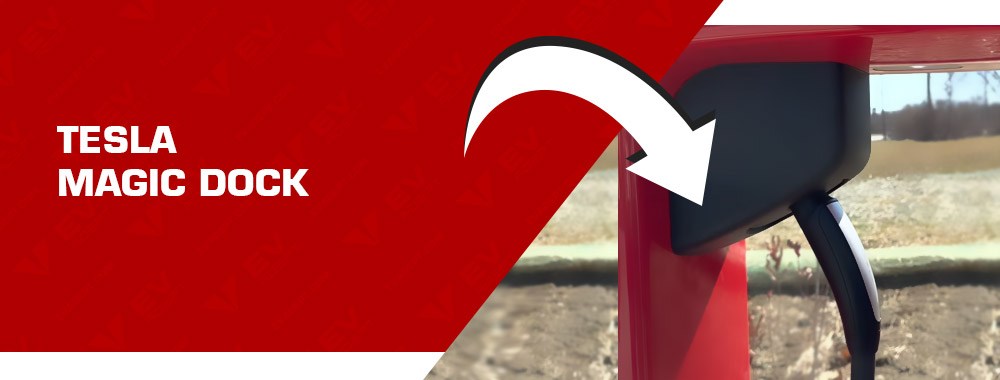
How Does the Magic Dock Work with Tesla Superchargers?
The Magic Dock is an adapter-box device that allows non-Tesla EVs to charge at Tesla Superchargers. The availability of The Magic Dock at stations is extremely limited, and today it can be found only at less than 1% of stations. This is why many non-Tesla owners still have the desire to have their own adapter.
It’s a built-in solution that’s integrated into the Superchargers themselves. This means that Tesla doesn’t have to install new Superchargers to accommodate non-Tesla vehicles. Instead, they can simply retrofit the existing Superchargers with the Magic Dock. This makes it easier for non-Tesla EV owners to charge their vehicles at Superchargers, as they don’t have to worry about buying and carrying around an adapter.
How to use Magic Dock?
To use it, you need to download the Tesla app, set up an account, and provide a form of payment. Once you’ve chosen a charger at a Tesla station, you can unlock the adapter through the app. The process is simple: push the handle into the dock, then pull it out to remove. However, it’s important to note that the charging process may take up to several minutes to start.
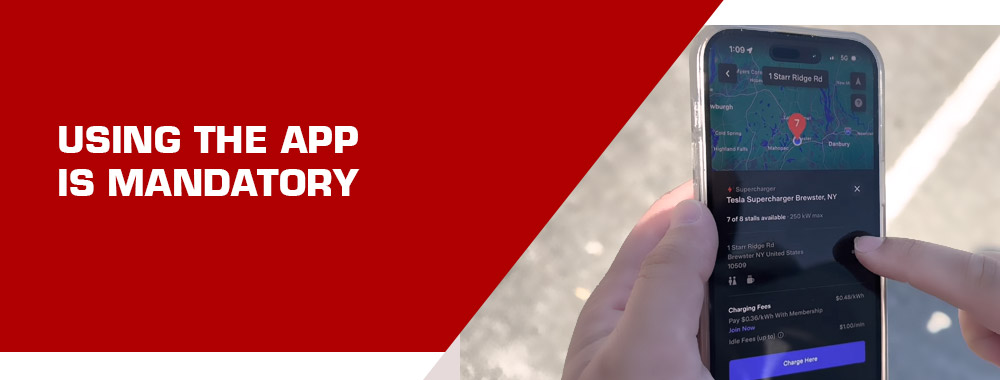
The Magic Dock’s Growing Presence in Select Locations
The Magic Dock is currently available at 11 stations across America, with more expected to be added in the future. In Europe, the number of Superchargers equipped with the Magic Dock is even higher. This widespread availability of the Magic Dock is a testament to Tesla’s commitment to making EV charging more accessible and convenient for all EV owners, not just those who own a Tesla.
| Tesla Magic Dock Locations | Address | Google Maps Link |
|---|---|---|
| Turning Stone Resort Casino, Verona, NY | 5218 Patrick Rd, Verona, NY 13478, USA | Link |
| Red Hook Supercharger, Red Hook, NY | 7580 N Broadway, Red Hook, NY 12571, USA | Link |
| Dunkin’ Brewster, Brewster, NY | 1041 NY-22, Brewster, NY 10509, USA | Link |
| Denny’s – Fredonia, Fredonia, NY | 10390 Bennett Rd, Fredonia, NY 14063, USA | Link |
| Malta Ridge Supercharger, Ballston Spa, NY | 2951 State Hwy 9, Ballston Spa, NY 12020, USA | Link |
| Scotts Valley Supercharger, Scotts Valley, CA | 230 Mt Hermon Rd, Scotts Valley, CA 95066, USA | Link |
| Town of Hancock, Hancock, NY | 661 W Main St, Hancock, NY 13783, USA | Link |
| Placerville – Target, Placerville, CA | 3968 Missouri Flat Rd, Placerville, CA 95667, USA | Link |
| Towne Center Batavia, Batavia, NY | 4210-46 Veterans Memorial Dr, Batavia, NY 14020, USA | Link |
| Grist Mill Restaurant, Parish, NY | 3039 County Rte 26, Parish, NY 13131, USA | Link |
| Shirley Supercharger, Shirley, NY | 1216-1252, Broadway, Shirley, NY, USA | Link |
What Challenges Might You Face When Charging a Non-Tesla EV at a Tesla Supercharger?
While the Magic Dock opens up new possibilities for EV charging, it’s not without its challenges. For instance, the charging cables at Tesla Superchargers are designed for Tesla vehicles, which means they may not reach the charging port of a non-Tesla EV. This could potentially require you to take up more than one charging spot, which could be problematic at busy charging stations.
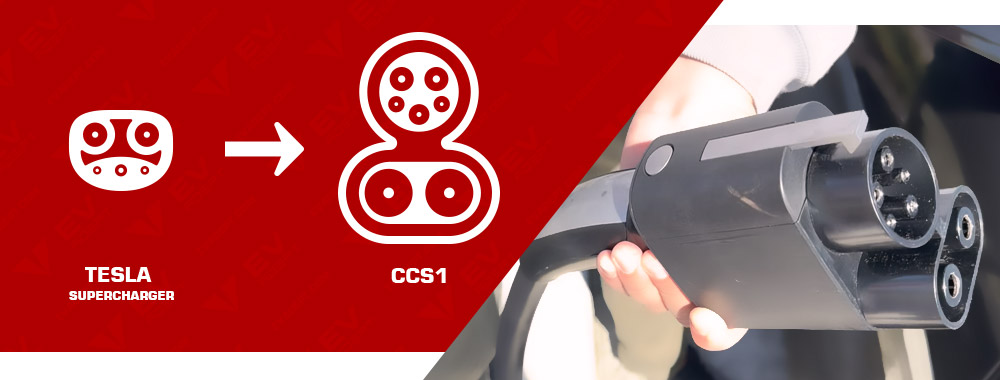
How Do Tesla Owners Feel About Non-Tesla EVs Using Superchargers?
The response from Tesla owners to non-Tesla EVs using Superchargers has been mixed. Some Tesla owners are excited about the increased charger access, viewing it as a step towards driving EV adoption. However, others express concerns about potential overcrowding at charging stations.
What Are the Costs Associated with Charging a Non-Tesla EV at a Tesla Supercharger?
Charging a non-Tesla EV at a Tesla Supercharger isn’t cheap. The cost is 49 cents per kilowatt hour, which is more than twice the cost of charging at home. However, Tesla offers a membership plan that allows you to reduce the cost by 10 cents per kilowatt-hour for a monthly fee of $12.99. The convenience of being able to charge while on a long trip or out of state could make it worth the cost for some EV owners.
We are looking forward to the portable version for sale
The next step provides the ability to charge non-Tesla cars at all Tesla-owned Supercharger AC stations; Tesla representatives announced this in the summer of 2021. Find out is necessary in this article.
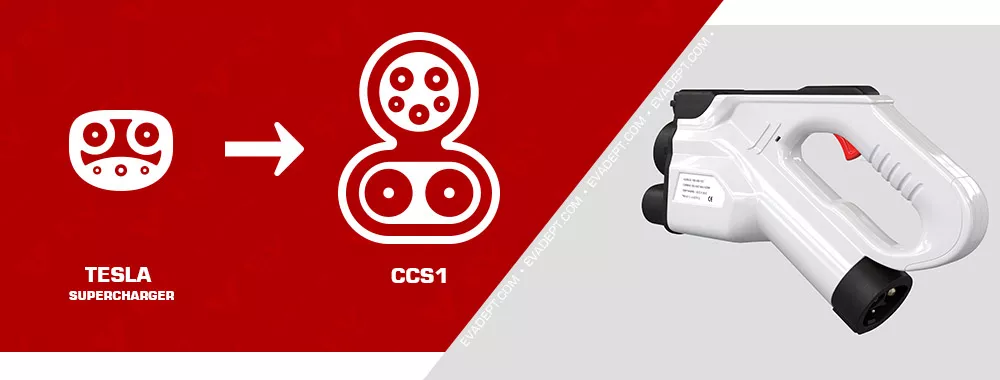
Is it possible to charge a non-Tesla car on a Supercharger?
Using the special TCP to CSS1 adapter (or the Magic Dock), it will soon be possible to charge almost any electric vehicle from direct current in a short amount of time.
Can a non-Tesla vehicle be charged at other Tesla stations?
The possibility of charging electric cars at Level 2 charging stations like the Tesla Destination has already existed and is already in use by some motorists. This type of charging station can be found, for example, near hotels or in mall parking lots. To connect, for example, a Chevy Bolt, an additional adapter has to be purchased.
What are the differences between Tesla charging stations: Supercharger and Destination?
The difference is the charging speed, which is due to the Supercharger’s increased power and constant current. Depending on the electric car model, 30 minutes may be enough time to charge an empty battery to 80%.
How is the charging rate different and how is it calculated?
One of the main indicators of electric car charging is MPH, which means how many miles the car will travel after an hour of continuous charging. Input power is also limited by the electric car’s power supply, which often does not exceed 48 amps for Level 1 and Level 2 chargers. But the supercharger is a constant current charging station (sometimes you can see the names Level-3 or DCFC), which is not subject to the limits of the electric car’s power supply unit. Although there is a limit to its speed. It is 5–10 times faster (depending on the electric vehicle) than, for example, charging from Level 2 connected to a NEMA 14-50.
How much will it cost to charge a non-Tesla car at Supercharger?
For example, for a Ford Mustang Mach-E owner, according to Tesla representatives, the price could be higher than for Tesla cars (the cost is 49 cents per kilowatt-hour). It was also reported that the option of an increased price factor for electric cars that charge slowly has not been ruled out so that they do not take up space and create a long lines.
Today, even for Tesla motorists, the price is not fixed on that network and largely depends on the region. To charge a fully discharged Tesla Model 3 battery to 80% on average, you’ll have to pay $10 on the Supercharger network (depends on the state and time of day).
If you are interested in comparing prices, you can use the ready-made calculator by setting your own parameters.
How will charging on the supercharger for non-Tesla vehicles be handled?
To charge, for example, a Chevy Volt, you will have to install the Tesla app on your smartphone, through which identification and billing takes place.
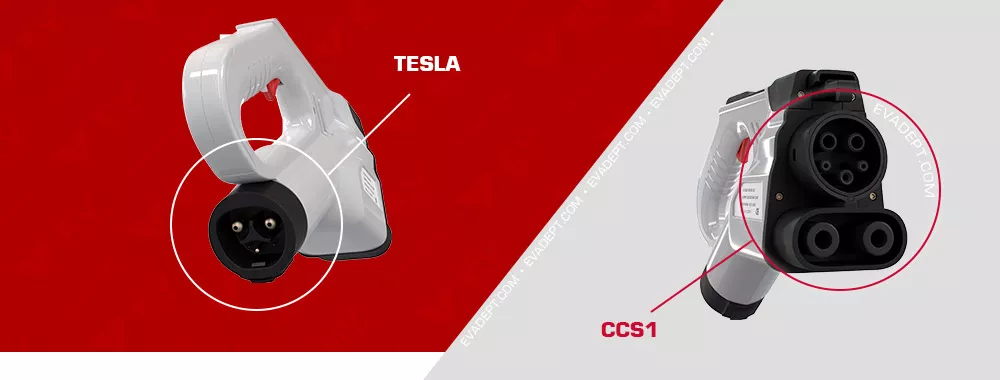
What adapter is needed to charge a non-Tesla on a Supercharger?
You’ll need a NACS-to-CCS1 adapter (also called a Tesla to CCS adapter) to charge a Porsche Taycan or other non-Tesla car in North America.
How reliable is such an adapter? What are the difficulties and why?
The charging station communicates in its own language with the electric car, but the languages are different between the Supercharger and the non-Tesla car. Therefore, the Tesla to CCS adapter has not only a set of wires and housing but also a translator with its own software. To maximize the mutual compatibility between the charging station and the cars of different manufacturers, the software version is updated over time, so more recent adapters are theoretically more stable in operation.
How does the Tesla to CCS adapter work, and how is it different from other adapters?
The adapter connects on the Supercharger side. The other end of the adapter is inserted into the inlet of the electric car with the CCS1 connector.
Cost of charging a non-Tesla car at the Supercharger station (with a Tesla to CCS1 adapter)
| Chevy Bolt 65kWh | Nissan Leaf 62kWh | Volkswagen ID.4 77kWh | |
|---|---|---|---|
| Tesla Supercharger • 150KW (DC) | $10.14 | $9.67 | $12.01 |
| EV Connect • Level 2 • 7.7KW (AC) | $13.86 | $8.4 | $15.16 |
| ChargePoint • Level 2 • 6.6KW (AC) | $3.96 | $2.4 | $4.62 |
*Calculation is approximate, based on the average cost ($0.26/kW) of Tesla cars. Other data? Use the Supercharger calculator.
Where can I buy a Tesla to CCS adapter?
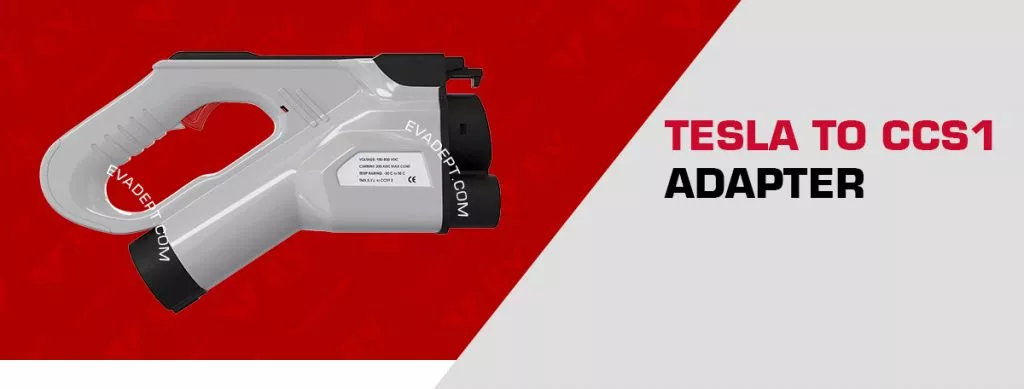
We are currently accepting pre-orders, notifying our customers when the adapters are available. As of today, we have information about prototypes from product suppliers. Probably one of the main manufacturers will be Setec power, which has experience in creating smart backward adapters for Tesla communication and CCS charging stations.
Contents
- 1 How Does the Magic Dock Work with Tesla Superchargers?
- 2 How to use Magic Dock?
- 3 The Magic Dock’s Growing Presence in Select Locations
- 4 What Challenges Might You Face When Charging a Non-Tesla EV at a Tesla Supercharger?
- 5 How Do Tesla Owners Feel About Non-Tesla EVs Using Superchargers?
- 6 What Are the Costs Associated with Charging a Non-Tesla EV at a Tesla Supercharger?
- 7 We are looking forward to the portable version for sale
- 8 Is it possible to charge a non-Tesla car on a Supercharger?
- 9 Can a non-Tesla vehicle be charged at other Tesla stations?
- 10 What are the differences between Tesla charging stations: Supercharger and Destination?
- 11 How is the charging rate different and how is it calculated?
- 12 How much will it cost to charge a non-Tesla car at Supercharger?
- 13 How will charging on the supercharger for non-Tesla vehicles be handled?
- 14 What adapter is needed to charge a non-Tesla on a Supercharger?
- 15 How reliable is such an adapter? What are the difficulties and why?
- 16 How does the Tesla to CCS adapter work, and how is it different from other adapters?
- 17 Cost of charging a non-Tesla car at the Supercharger station (with a Tesla to CCS1 adapter)
- 18 Where can I buy a Tesla to CCS adapter?
What is the Magic Dock?
The Magic Dock is a device with the NACS-to-CCS1 adapter that allows non-Tesla EVs to charge at Tesla Superchargers.
How do I use the Magic Dock at a Tesla Supercharger?
To use the Magic Dock, you need to download the Tesla app, set up an account, and provide a form of payment. Once you’ve chosen a charger at a Tesla station, you can unlock the adapter through the app.
How long does it take to start charging with the Magic Dock?
After plugging in, it may take up to two minutes for the charging to start.
Can the charging cables at Tesla Superchargers reach the charging port of a non-Tesla EV?
The charging cables at Tesla Superchargers are designed for Tesla vehicles, which means they may not reach the charging port of a non-Tesla EV. This could potentially require you to take up more than one charging spot.
How do Tesla owners feel about non-Tesla EVs using Superchargers?
The response from Tesla owners to non-Tesla EVs using Superchargers has been mixed. Some are excited about the increased charger access, while others express concerns about potential overcrowding at charging stations.
How much does it cost to charge a non-Tesla EV at a Tesla Supercharger?
The cost is 49 cents per kilowatt hour, which is more than twice the cost of charging at home.
Is Tesla planning to make changes to accommodate non-Tesla EVs at Superchargers?
Yes, Tesla is considering designing new chargers with longer cables to accommodate non-Tesla EVs.
Is Tesla planning to open up more Supercharger locations?
Tesla is planning to open up thousands of new charging locations, which will increase access for all EV owners. Until that happens, many people want to have their own adapter.
Can I rely on the Tesla Supercharger network for my non-Tesla EV?
Currently, the Tesla Supercharger network is still in a beta phase for non-Tesla EVs, and there may be some inconsistencies and challenges. However, Tesla is actively working on improving the system.
What is the Tesla-to-CCS adapter?
The Tesla-to-CCS (or NACS-to-CCS1) adapter is a device that allows non-Tesla EVs with a CCS charging port to connect to a Tesla Supercharger.
Can all non-Tesla EVs use the Tesla-to-CCS adapter?
The compatibility of the Tesla-to-CCS adapter may vary depending on the specific model of the non-Tesla EV. Always check the compatibility of your EV with the adapter before attempting to charge. For example, among the owners of IONIQ 5 only 20% were able to use this method.
Where can I get a Tesla-to-CCS adapter?
So far only available for use in limited quantities where Magic Dock is installed. The Tesla-to-CCS adapter is currently being tested and is not widely available for purchase. We will notify you when it’s on sale if you subscribe to the pre-order list of important arrivals.

I got my hands on the Magic Dock last week, and I’ve been testing it out with my Nissan Leaf. Gotta say, it’s a game-changer. No more hunting for compatible chargers. The charging speed was impressive, almost as if I was using a native Tesla. The only downside? The price. I wish Tesla would be more transparent about the cost. Anyone else tried it yet? What are your thoughts?
Hey folks, I’ve been hearing a lot about this Magic Dock. Does anyone know if it’s compatible with the Chevy Bolt? I’ve been thinking of getting one, but I want to be sure it’ll work with my car.
For those who’ve just got the Magic Dock, here’s a quick guide on how to use it: 1. Connect the Magic Dock to the Supercharger. 2. Plug the CCS connector into your non-Tesla EV. 3. Wait for the charging indicator to light up. 4. Monitor the charging process via the Tesla app. Remember, always ensure your car’s software is updated for optimal charging. Hope this helps!
I’m new to the EV world and looking to buy my first electric car. With the introduction of the Magic Dock, should I consider non-Tesla cars as well? What’s the best EV in terms of range and features for a newbie like me?
I’ve been using the Magic Dock for a month now, and lately, I’ve noticed some intermittent charging issues. Sometimes it just stops mid-charge. Anyone else facing this? Any solutions?
I’ve been comparing the Magic Dock to other adapters in the market, and while Tesla’s solution is innovative, there are cheaper alternatives out there. However, the convenience of using Superchargers might justify the cost for many. Thoughts?
Quick tip for Magic Dock users: If you’re facing slow charging speeds, try resetting the adapter by unplugging and plugging it back in. Worked wonders for me!
Heads up! Tesla just announced that they’ll be deploying more Magic Docks in Florida by the end of April. Great news for Sunshine State EV owners!
Anyone in the Seattle area interested in a group buy for the Magic Dock? Might get a discount if we order in bulk. DM me if interested.
Just read a report about a Magic Dock malfunctioning and causing minor damage to a car in Oregon. Be cautious and always monitor your charging sessions, folks!